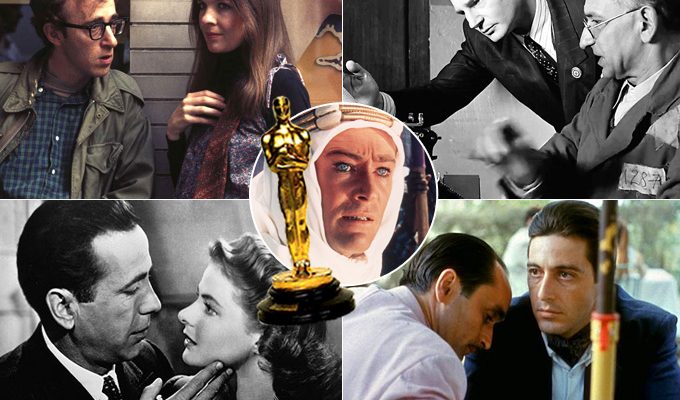 5. “Annie Hall” (1977)
5. “Annie Hall” (1977)
Brilliant, absurd, hilarious, poignant and sad, Woody Allen’s finest hour is great for many things, among them: Diane Keaton, Diane Keaton’s hats, Diane Keaton’s vests, Diane Keaton’s delivery of “Lah-di-dah,” Diane Keaton’s line readings in general. To be fair, Allen gets a few good moments too and the skewering of a relationship in which neurosis and self-absorption will always overcome affection is pin-sharp, but Keaton’s peculiar, awkward charm deserved to have a film this good written for it.
4. “The Godfather” (1972)
The first in maybe the greatest four-movie run any American director has ever achieved (“The Conversation” was up next, followed by “The Godfather II” and “Apocalypse Now”), Francis Ford Coppola’s adaptation of the Mario Puzo novel is that rare film that has spawned so many parodies and references and yet still feels shockingly fresh each time you come to it. Simply one of the greatest films ever made, there have been times when the Academy got it wrong, but this was not one of them.
3. “Casablanca” (1943)
Michael Curtiz‘s miraculous WWII picture defies genre—is it a thriller? a romance? an adventure?—but whatever it is, it’s pretty much perfect. Every element, from Humphrey Bogart and Ingrid Bergman as the leads, and the dense supporting cast, to the photography, to the music, to the all-timer of a script, works like gangbusters. It’s soulful, funny, heartbreaking, hugely exciting cinema, and all while feeling totally effortless that belies how hard it is to get it this right.
2. “The Godfather Part II” (1974)
There was some internal debate at The Playlist as to which of Francis Ford Coppola‘s gangster classics would come ahead of the other. Ultimately, it was ‘Part II’ that won out: one of only two sequels to win Best Picture (the other being “Return Of The King,”) it takes everything that made the original so great, and expands on it, filling in Vito’s backstory thanks to a breakthrough performance from Robert De Niro, while pushing his son Michael into darker and darker territory. Impeccable stuff.
1. “Lawrence Of Arabia” (1962)
So here we are. While any of the top ten (at least) could have filled the top slot, what’s most surprising (to us with our bloodied noses and bruised fists) is that the number one spot was the subject of exactly zero internecine wrangling—at the very top of the list you have as near to a unanimous choice as we’ve made on this whole 85-strong catalogue. Simply put, we’d argue that no Oscar-winner takes advantage of the artform in the way that David Lean‘s “Lawrence Of Arabia” does. It’s sweeping, jaw-dropping cinema from minute one to minute 222, the rare film that captures the whole sweep of a man’s life while still telling a remarkable, fat-free story. Both Lean and star Peter O’Toole are at the peak of the powers, but ultimately, it wins the top slot by managing to create images and moments that have never been—and perhaps could never be—equaled.
So that’s our take, arrived at with not a little heartache on all our parts. Our capacious comments section is at your disposal for vitriol, death threats, allegations of insanity and unfounded rumormongering as to the modesty of our mothers. Oh, and reasoned argument too. — Jessica Kiang, Oliver Lyttelton

